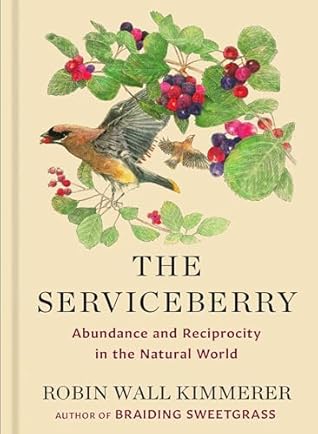More on this book
Community
Kindle Notes & Highlights
Started reading
March 27, 2025
Eating with the seasons is a way of honoring abundance, by going to meet it when and where it arrives.
In a traditional Anishinaabe economy, the land is the source of all goods and services, which are distributed in a kind of gift exchange: one life is given in support of another. The focus is on supporting the good of the people, not only an individual. Receiving a gift from the land is coupled to attached responsibilities of sharing, respect, reciprocity, and gratitude—of which you will be reminded.
Recognizing “enoughness” is a radical act in an economy that is always urging us to consume more.
Ecopsychologists have shown that the practice of gratitude puts brakes on hyperconsumption. The relationships nurtured by gift thinking diminish our sense of scarcity and want. In that climate of sufficiency, our hunger for more abates and we take only what we need, in respect for the generosity of the giver. Climate catastrophe and biodiversity loss are the consequences of unrestrained taking by humans.
Gratitude and reciprocity are the currency of a gift economy, and they have the remarkable property of multiplying with every exchange, their energy concentrating as they pass from hand to hand, a truly renewable resource.
Why then have we permitted the dominance of economic systems that commoditize everything? That create scarcity instead of abundance, that promote accumulation rather than sharing? We’ve surrendered our values to an economic system that actively harms what we love.
The currency in a gift economy is relationship, which is expressed as gratitude, as interdependence and the ongoing cycles of reciprocity.
The guidelines of the Honorable Harvest are not usually written down, they are reinforced in small acts of daily life. But if I were to list them they would look something like this: Know the ways of the ones who take care of you, so that you can take care of them. Introduce yourself. Be accountable as the one who comes asking for a life. Ask permission before taking. Abide by the answer. Never take the first one. Never take the last. Take only what you need. Take only that which is given. Never take more than half. Leave some for others. Harvest in a way that minimizes harm. Use it
...more
Continued fealty to economies based on competition for manufactured scarcity, rather than cooperation around natural abundance, is now causing us to face the danger of producing real scarcity, evident in growing shortages of food and clean water, breathable air, and fertile soil.
The currency of this gift economy is relationship and a neighborhood where people know each other’s names, even the curmudgeons. The Tragedy of the Commons became the Abundance of Community. This is a gift economy in reach of everyone. It’s subversive. And delicious.
That, I think, is the power of ceremony: it marries the mundane to the sacred. The water turns to wine, the coffee to a prayer. The material and the spiritual mingle like grounds mingled with humus, transformed like steam rising from a mug into the morning mist. What else can you offer the earth, which has everything? What else can you give but something of yourself? A homemade ceremony, a ceremony that makes a home.


